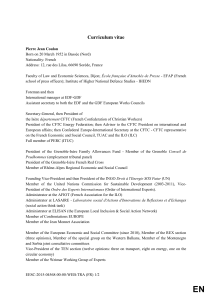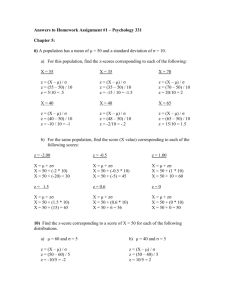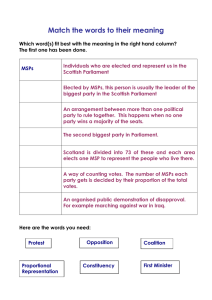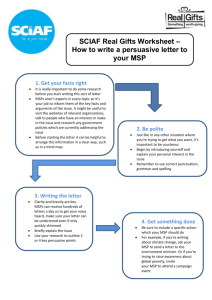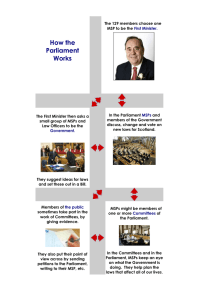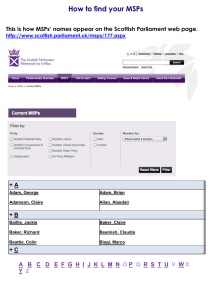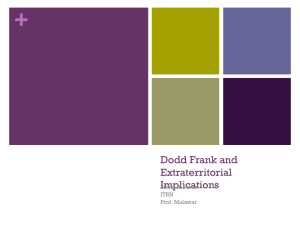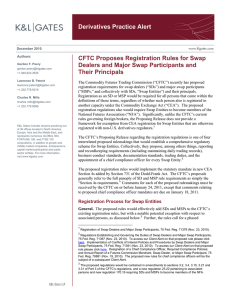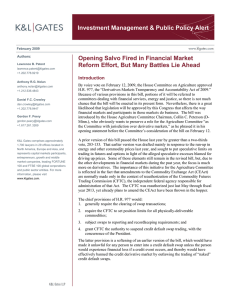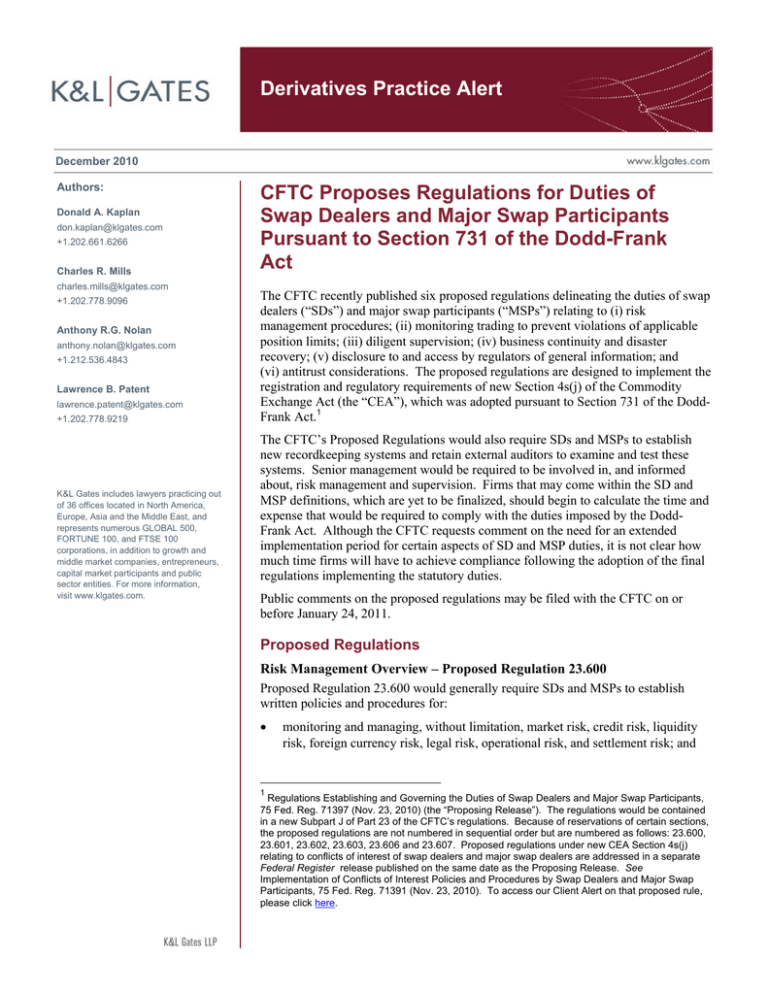
Derivatives Practice Alert
December 2010
Authors:
Donald A. Kaplan
don.kaplan@klgates.com
+1.202.661.6266
Charles R. Mills
charles.mills@klgates.com
+1.202.778.9096
Anthony R.G. Nolan
anthony.nolan@klgates.com
+1.212.536.4843
Lawrence B. Patent
lawrence.patent@klgates.com
+1.202.778.9219
K&L Gates includes lawyers practicing out
of 36 offices located in North America,
Europe, Asia and the Middle East, and
represents numerous GLOBAL 500,
FORTUNE 100, and FTSE 100
corporations, in addition to growth and
middle market companies, entrepreneurs,
capital market participants and public
sector entities. For more information,
visit www.klgates.com.
CFTC Proposes Regulations for Duties of
Swap Dealers and Major Swap Participants
Pursuant to Section 731 of the Dodd-Frank
Act
The CFTC recently published six proposed regulations delineating the duties of swap
dealers (“SDs”) and major swap participants (“MSPs”) relating to (i) risk
management procedures; (ii) monitoring trading to prevent violations of applicable
position limits; (iii) diligent supervision; (iv) business continuity and disaster
recovery; (v) disclosure to and access by regulators of general information; and
(vi) antitrust considerations. The proposed regulations are designed to implement the
registration and regulatory requirements of new Section 4s(j) of the Commodity
Exchange Act (the “CEA”), which was adopted pursuant to Section 731 of the DoddFrank Act.1
The CFTC’s Proposed Regulations would also require SDs and MSPs to establish
new recordkeeping systems and retain external auditors to examine and test these
systems. Senior management would be required to be involved in, and informed
about, risk management and supervision. Firms that may come within the SD and
MSP definitions, which are yet to be finalized, should begin to calculate the time and
expense that would be required to comply with the duties imposed by the DoddFrank Act. Although the CFTC requests comment on the need for an extended
implementation period for certain aspects of SD and MSP duties, it is not clear how
much time firms will have to achieve compliance following the adoption of the final
regulations implementing the statutory duties.
Public comments on the proposed regulations may be filed with the CFTC on or
before January 24, 2011.
Proposed Regulations
Risk Management Overview – Proposed Regulation 23.600
Proposed Regulation 23.600 would generally require SDs and MSPs to establish
written policies and procedures for:
•
1
monitoring and managing, without limitation, market risk, credit risk, liquidity
risk, foreign currency risk, legal risk, operational risk, and settlement risk; and
Regulations Establishing and Governing the Duties of Swap Dealers and Major Swap Participants,
75 Fed. Reg. 71397 (Nov. 23, 2010) (the “Proposing Release”). The regulations would be contained
in a new Subpart J of Part 23 of the CFTC’s regulations. Because of reservations of certain sections,
the proposed regulations are not numbered in sequential order but are numbered as follows: 23.600,
23.601, 23.602, 23.603, 23.606 and 23.607. Proposed regulations under new CEA Section 4s(j)
relating to conflicts of interest of swap dealers and major swap dealers are addressed in a separate
Federal Register release published on the same date as the Proposing Release. See
Implementation of Conflicts of Interest Policies and Procedures by Swap Dealers and Major Swap
Participants, 75 Fed. Reg. 71391 (Nov. 23, 2010). To access our Client Alert on that proposed rule,
please click here.
Derivatives Practice Alert
•
assessing the effectiveness, and correcting any
identified weaknesses, of their risk management
programs.
The governing body of an SD or MSP would be
required to approve the written policies and
procedures and furnish them to the CFTC.
The CFTC would require that management
programs provide assurance of specified matters,
including (i) the firm’s risk management unit is
independent from the business unit that creates the
risk, (ii) personnel that record transactions are
separate from those that execute transactions, (iii) all
accounts, including nostro accounts and suspense
accounts used to store short-term funds or securities
pending allocation, are monitored, and
(iv) management’s periodic reviews of the firm’s
business activities to assure they are consistent with
its risk management policies. The Proposing
Release sets forth a framework for a risk
management structure that would seek to address
every type of risk, including any unique or unusual
risks, associated with each swap product before
trading of such product begins. Proposed
Regulation 23.600 also would establish general
parameters for, among other things, the design,
implementation, review, and testing of a firm’s risk
management program.
Proposed Regulation 23.600 also would require each
legal entity that is an SD or MSP to establish its own
risk management program and risk management
unit. However, to protect against the risks resulting
from activities of affiliates, proposed Regulation
23.600 would require that risk management across
all affiliates be integrated at the consolidated entity
level, to the extent possible.
The Proposed Rule’s non-exclusive list of required
supervisory features for all risk management
programs includes: (i) identification of risks,
(ii) establishment of risk tolerance limits; (iii) the
provision of periodic risk exposure reports to senior
management and the governing body;
(iv) monitoring limits of individual traders; and
(v) establishment of procedures for the use of
algorithmic trading programs. The CFTC’s goal is
to assure that every person capable of committing
the firm’s capital is properly supervised and subject
to approved limits.
Finally, the Proposed Rule would require the
quarterly review and testing of a firm’s risk
management programs by internal audit staff or a
qualified external service. Such regular review is
intended to test the continued effectiveness of firms’
risk management programs.
Monitoring of Position Limits – Proposed
Regulation 23.601
New CEA Section 4s(j)(1) requires firms to monitor
their swap trading to prevent violations of
applicable position limits. Proposed Regulation
23.601 would require SDs and MSPs to establish
policies and procedures to monitor, detect and
prevent violations of applicable position limits
established by the CFTC, a designated contract
market, or swap execution facility. The Proposed
Rule specifically requires that SDs and MSPs
properly train employees, monitor trading,
implement an early warning system, test the
effectiveness of their policies, and provide quarterly
written reports to senior management and the
governing body concerning compliance with
applicable position limits.
Diligent Supervision – Proposed Regulation
23.602
Proposed Regulation 23.602 would require SDs and
MSPs to conform with CFTC regulations relating to
diligent supervision of their businesses. The
proposed regulation would require (i) diligent
supervision reasonably designed to achieve
compliance with the CEA and CFTC regulations;
and (ii) standards for qualifications of supervisors
and grants of appropriate supervisory authority.
Business Continuity and Disaster Recovery –
Proposed Regulation 23.603
The Proposing Release states that, because of the
interconnectedness of the swap markets, the CFTC
believes that each SD and MSP should be required
to establish and maintain a business continuity and
disaster recovery plan that is reasonably designed to
minimize disruption of the firm’s business
operations. Pursuant to proposed Regulation
23.603, all SDs’ and MSPs’ business continuity and
disaster recovery plans should be designed so that,
in the event of a disruption, the firm could resume
normal operations within one business day. To
achieve this goal, firms would be required to furnish
the CFTC with emergency contacts; identify
essential documents, data, facilities, infrastructure,
and personnel; maintain adequate back-up facilities
in a geographic location reasonably distant from the
December 2010
2
Derivatives Practice Alert
firm’s primary facilities; design a plan for
communicating with persons essential for recovery;
and annually test the effectiveness of the plan.
prevent unreasonable restraint of trade or the
imposition of a material anticompetitive burden on
trading or clearing.
Disclosure and Ability to Obtain Information –
Proposed Regulation 23.606
In order for the CFTC to carry out its oversight and
examination responsibilities, SDs and MSPs would
be required to provide the CFTC with access to
certain information. New Sections 4s(j)(3) and
4s(j)(4) of the CEA require that SDs and MSPs
make certain disclosures to the CFTC and to the
firm’s banking regulator, if any, relating to the terms
and conditions of the firm’s swaps, trading
operations, mechanisms, practices, as well as its
financial integrity relating to swaps, and other
relevant information. SDs and MSPs must also
establish internal systems to obtain necessary
information to perform any functions described in
new CEA Section 4s, and for disclosure to the CFTC
or banking regulator upon request. Proposed
Regulation 23.606 would implement these
requirements by requiring that SDs and MSPs
(i) make available for disclosure and inspection all
information required by the CFTC; and (ii) establish
and maintain adequate internal systems that will
permit them to obtain any information required to
satisfy their duties under new Section 4s(j) of the
CEA.
The Proposed Regulation simply parrots statutory
language, providing no further definition or context
to clarify what this new requirement entails. If the
term “unreasonable restraint of trade” simply refers
to what is prohibited under Section 1 of the
Sherman Act, the provision would be entirely
redundant, leading potentially to inconsistent
enforcement between the CFTC and the Department
of Justice. On the other hand, the standard could be
interpreted to justify action against practices that the
agency finds anticompetitive, but would not be
actionable under the antitrust laws. The addition of
the phrase “or imposes any material anticompetitive
burden on trading or clearing” would appear to
support this view. Such an approach would be
similar to that of the Federal Energy Regulatory
Commission (the “FERC”), which imposes
requirements on competitive electricity market
participants that are not derived from antitrust law
jurisprudence. FERC’s actions are driven, however,
by a line of court cases that have interpreted the
Federal Power Act, 16 U.S.C. §§ 824 et seq.
(FERC’s governing statute) as requiring FERC to
promote competition.
Antitrust Considerations –- Proposed
Regulation 23.607
Pursuant to Section 4s(j)(6) of the CEA, SDs and
MSPs are prohibited from adopting any process or
taking any action that results in any unreasonable
restraint of trade, or imposing any material
anticompetitive burden on trading or clearing, unless
necessary or appropriate to achieve the purposes of
the CEA. Proposed Regulation 23.607 would
implement these prohibitions by requiring that SDs
and MSPs adopt policies and procedures that would
Conclusion
The proposed regulations are part of the mosaic of
emerging regulations that will affect many aspects
of the U.S. swaps markets. While principally
directed at SDs and MSPs, the proposed regulations
and other new rules will ultimately affect all
participants in those markets.
December 2010
3
Derivatives Practice Alert
Anchorage Austin Beijing Berlin Boston Charlotte Chicago Dallas Dubai Fort Worth Frankfurt Harrisburg Hong Kong London
Los Angeles Miami Moscow Newark New York Orange County Palo Alto Paris Pittsburgh Portland Raleigh Research Triangle Park
San Diego San Francisco Seattle Shanghai Singapore Spokane/Coeur d’Alene Taipei Tokyo Warsaw
Washington, D.C.
K&L Gates includes lawyers practicing out of 36 offices located in North America, Europe, Asia and the Middle East, and represents numerous
GLOBAL 500, FORTUNE 100, and FTSE 100 corporations, in addition to growth and middle market companies, entrepreneurs, capital market
participants and public sector entities. For more information, visit www.klgates.com.
K&L Gates comprises multiple affiliated entities: a limited liability partnership with the full name K&L Gates LLP qualified in Delaware and
maintaining offices throughout the United States, in Berlin and Frankfurt, Germany, in Beijing (K&L Gates LLP Beijing Representative Office), in
Dubai, U.A.E., in Shanghai (K&L Gates LLP Shanghai Representative Office), in Tokyo, and in Singapore; a limited liability partnership (also named
K&L Gates LLP) incorporated in England and maintaining offices in London and Paris; a Taiwan general partnership (K&L Gates) maintaining an
office in Taipei; a Hong Kong general partnership (K&L Gates, Solicitors) maintaining an office in Hong Kong; a Polish limited partnership (K&L
Gates Jamka sp.k.) maintaining an office in Warsaw; and a Delaware limited liability company (K&L Gates Holdings, LLC) maintaining an office in
Moscow. K&L Gates maintains appropriate registrations in the jurisdictions in which its offices are located. A list of the partners or members in each
entity is available for inspection at any K&L Gates office.
This publication is for informational purposes and does not contain or convey legal advice. The information herein should not be used or relied upon
in regard to any particular facts or circumstances without first consulting a lawyer.
©2010 K&L Gates LLP. All Rights Reserved.
December 2010
4

